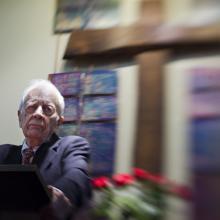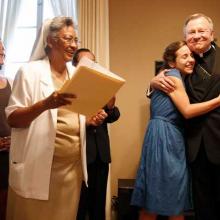discernment
When campus life shuttered in March to slow the spread of the coronavirus, more than 14 million students across the nation were forced to adapt to new routines. Campus lawns speckled with students gave way to uniform rows of faces on video calls. The now coined “Zoom fatigue” replaced “pulling an all-nighter” at the library.
While the pandemic has strained students from all academic disciplines, seminary and divinity students have felt unique pressure as they discern calls to enter positions and spaces of worship that may not resemble what they did before the virus took hold.
Four students shared with Sojourners what their studies look like amid the pandemic and how this moment is shaping their call.
LENT IS A season of introspection and reflection as we prepare for Easter. By observing the 40 days of Lent, we replicate Jesus’ sacrifice and withdrawal into the desert for 40 days.
When I was 16, my mom accepted a new job at the University of Arizona, and my parents made the untimely decision to uproot our family and move from the Pacific Northwest to the Arizona desert just before my last year in high school. As a result, I know something about deserts.
Deserts are not simply physical places—they are also spiritual and emotional seasons in our lives. What the physical desert does to the body, the spiritual desert does to our soul, making us feel drained and depleted. In moments of spiritual desert, we can feel disoriented and alienated from God. St. John of the Cross referred to these as dark nights of the soul—times when “we feel a spiritual drought and estrangement from God.”
Nations can also go through what feel like periods of desert. America seems stuck in a dire one now. The current political crisis represents a test of our democracy and of the witness of the church. U.S. Christianity is also facing desert times as younger Christians abandon the church in record numbers.

Photo via CHOATphotographer / Shutterstock.com
When called to lead, Solomon didn’t seek his own glory, his own comfort, his own peace. Solomon sought the shalom of all his people. So, too, did the leaders above — and God said yes.
The movement to protect black lives gestated in the womb of our nation for years before Ferguson, but God birthed a movement in that place — in part because of wise and discerning leaders of faith.
May God help us all to enter the one year commemoration of Michael Brown’s death and the uprising in Ferguson, Mo., by reflecting on how we responded to God’s question a year ago: “What should I give you in the face of black death?”
The Internet is a wonderful, fascinating, and disturbing place — a petri dish of The Fall characterized by opinion as truth. As the Web Editor of Sojourners, I spend more time than anyone has a right to (or typically, the stomach for) perusing unconscionable clickbait, racism and sexism parading as deeply informed counter-thought, various analyses of others’ public failures, and, obviously, cat and baby memes.
I’m not sure how many times a headline has toyed with my emotions, threatening to “blow my mind” by dropping a “truth bomb” that “no one saw coming!” Invariably, whatever is behind the façade of amazement punctuated with eight exclamation points fails to impress (unless it’s this baby goat jumping for joy set to indie acoustic guitar), and I’m left with a handful of moments of my days I’ll never get back.
In the Christian publication world, we easily fall prey to this trend, and I’ll confess I fail on a fairly regular basis. A colleague and I were discussing how there seems to be a clear trend in Christian blog posts that are aimed at airing the church’s dirty laundry in attempts to prove “yeah, we’re Christians, but …” We’re Christians, but we’re not like them. We’re Christians, but you can probably believe whatever you want to believe and it’ll be fine. We’re Christians, but we’re not going to try to convert you. It goes a little something like:
Pope Francis’ comments last week on everything from gays to abortion (less talk, more mercy), the hierarchy (be pastors, not bureaucrats), and religious faith (doubt is part of belief) continue to reverberate through the church and the media.
Here are five broader insights that this wide-ranging interview revealed about Francis — and why they will be keys to reading his pontificate, and perhaps the future of Catholicism.
Gordon Cosby was my spiritual father, not simply a brother in Christ. This relationship continued for some 45 years until his dying days. In a time when egalitarianism defines nearly all relationships as the desired norm, it’s well to remember the role of mentors who maintain, purely through their own internal integrity and faithfulness, a spiritual authority in the lives of others. Gordon Cosby was such a person to me, and to countless others.
I first encountered Gordon when I was a young legislative aide on the rise in Washington, D.C., working for Senator Mark O. Hatfield and his legislative efforts to end the Vietnam War. Disgusted with the moral vacuity of the evangelicalism that had been my heritage, but searching for faith that was more than just following a progressive social agenda, I discovered the Church of the Saviour. Gordon’s insistence that following Jesus required a disciplined inner spiritual journey always expressed in joining God’s outward mission in the world captivated me then, and ever since.
In what is being described as the first of its kind in the U.S., the Archdiocese of New Orleans has transformed a vacant church rectory into a group house where single women will live together while deciding whether to undertake lives as nuns.
The center, dedicated on Aug. 15, occupies the second and third floors of the St. Rita rectory. Within a few days, two women, then perhaps three more, will move into the spotless rectory, their collective lives to be superintended by two veteran nuns who will show the younger women the dynamics of shared community life.
“How we live in community. How to communicate. How to share,” said Sister Carmen Bertrand, for 48 years a member of the Sisters of the Holy Family.
Beyond orienting them to the rhythms of community life, Bertrand and her colleague, Sister Diane Roche, a Religious of the Sacred Heart, will teach the tenants various modes of prayer, organize occasional retreats, and bring in representatives of other religious orders to present themselves and their ways of life.

Iraq/Iran. Image via Wylio http://bit.ly/zQUiV7
It’s hard to remember the warm-up to the Iraq war now almost 10 years old. Following the devastating experience of 9/11 (Sept. 11, 2001), the United States experienced enormous national feelings of anger and sought a means to identify and punish those who were guilty of this horrendous act of terror. We now know that within days, the White House (in particular, the vice president’s office) was pointing a finger at Iraq and within 12 months, any observer could tell that we were on our way to war.
On March 19, 2003, when the invasion began I remember telling a class of students that they ought to remember this day well. It might be a war the U.S. would regret and it might lead to an involvement in the Middle East we don’t know how to end. Now ten years later we’re still mired over there.
What were the reasons for the war? Let’s make a list:





